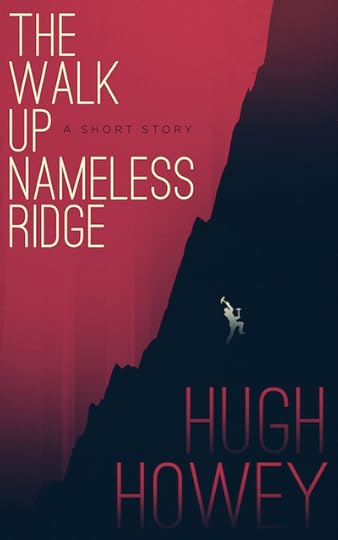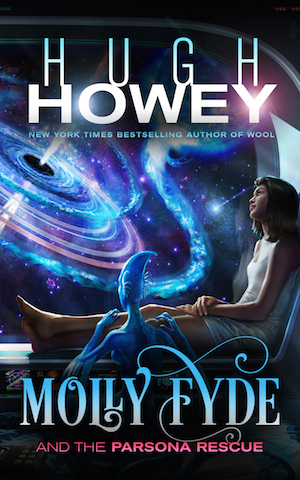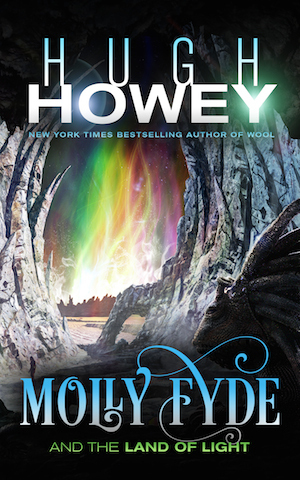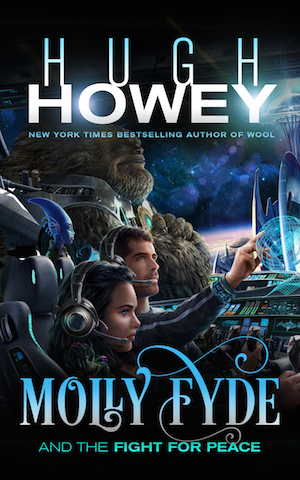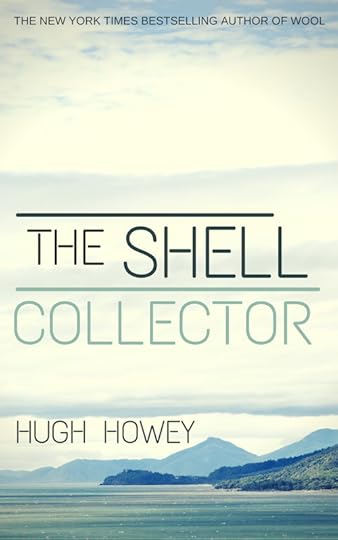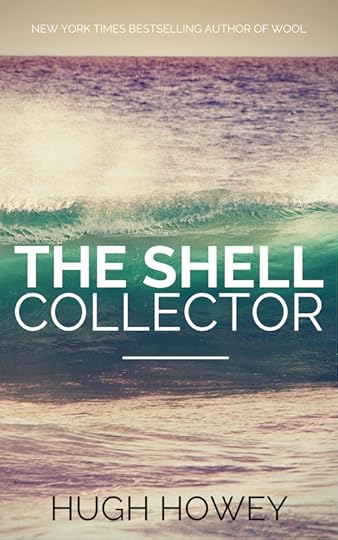Hugh Howey's Blog, page 31
August 17, 2014
Two Wrongs Don’t Make a Right
But three lefts do.
And what of Orwellian triple-speak? That’s like double-speak, except you circle back around to the truth again. I’m seeing some bizarre protestations about an Orwell quote making the rounds among the anti-Amazon crowd. When Amazon sent a letter to KDP authors asking them to help talk sense into Hachette, one of the points detractors seized upon was a quote from George Orwell about paperbacks. From the letter:
The famous author George Orwell came out publicly and said about the new paperback format, if “publishers had any sense, they would combine against them and suppress them.”
The quote was taken out of context, pundits and bloggers cried. The rest of the letter from Amazon was dismissed because of a single fact that seems to have been gotten backwards. In reality, they said, Orwell thought cheap paperbacks were great. He flat out says so. Can’t you hear the sarcasm dripping from his voice? He wasn’t really suggesting collusion.
Except he was. And he wasn’t being sarcastic at all. An intrepid researcher tracked down the origin of the quote, and Orwell was indeed suggesting, just as Amazon portrays, that he and others of his time thought cheap books would destroy the trade. Great for consumers, sure, but bad for everyone else. Here’s the link. And the quote in full:
The Penguin books are splendid value for sixpence, so splendid that if the other publishers had any sense they would combine against them and suppress them. It is, of course, a great mistake to imagine that cheap books are good for the book trade. Actually it is just the other way about. If you have, for instance, five shillings to spend and the normal price of a hook is half-a-crown, you are quite likely to spend your whole five shillings on two books. But if books are sixpence each you are not going to buy ten of them. because you don’t want as many as ten: your saturation point will have been reached long before that.
Probably you will buy three sixpenny books and spend the rest of your five shillings on seats at the “movies.” Hence the cheaper books become, the less money is spent on books. This is an advantage from the reader’s point of view and doesn`t hurt trade as a whole, but for the publisher, the compositor, the author, and the bookseller it is a disaster ….
If the other publishers follow suit, the result may be a flock of cheap reprints that will cripple the lending libraries (the novelist’s foster-mother) and check the output of new novels. This would be a fine thing for literature, but it would be at very bad thing for trade, and when you have to choose between art and money – well, finish it for yourself.
Publishers today—like Orwell was in his time—are terrified of affordable literature. Amazon’s point is that they were wrong, and that cheap paperbacks helped grow the entire pie of reading and enrich everyone in the industry. It bears mentioning, I think, that one of the pundits who twisted Orwell’s wording to suit his needs also freely admits that he encourages publishers to jack ebook prices up as high as possible to protect the print trade.
Another thing lost from this debate is that $9.99 is not the ideal price point for all ebooks. In fact, most ebooks would generate more revenue at even lower prices. $9.99 is like a speed limit. Exceed it in rare emergencies, but also feel free to drive slower where appropriate. Among the 120,000 ebooks we’ve analyzed at AuthorEarnings.com, $4.99 ends up being the bestselling price point by far. Some publishers know this. John Green’s THE FAULT IN OUR STARS (holy shit, what a brilliant book, as is everything the dude’s ever written; go read all his stuff) spends much of its time at $4.99.
The debuting authors and the midlist authors who would most benefit from price flexibility are the ones who are crushed by the stubborn pricing habits publishers employ.
Which has me wondering if we shouldn’t borrow a tactic from the art and photography worlds. We often hear that books aren’t widgets and shouldn’t be treated as such, well then let’s treat them like art. And in most artistic mediums, artists put their own price on their works. They decide what they’re worth.
How about allowing this be part of the negotiations with publishers? Price minimums or maximums. Because a lot of the affected Hachette authors I’ve spoken to wish their ebooks were priced much lower than $9.99. They wish they had the pricing freedoms that self-published authors enjoy. And I think they are right.
Pricing everything at $14.99 or $9.99 is what you do with widgets. Maybe publishers could stop doing that and letting the artists have some say.
The Alluring Mess of my WIP
Not since I, ZOMBIE have I so thoroughly loved writing a novel that I knew full-well everyone else would hate.
44,380 words into THE SHELL COLLECTOR. Well over halfway. I’m calling this a romance novel, but I have a feeling the readers of that genre will walk away disappointed. Because I have no clue what the hell I’m doing. But I’m loving every word of it.
My very rough estimate for a launch date is mid-October. But if this thing keeps writing itself the way it has been, it could be earlier than that. I just hope I can get David Gatewood to do the editing on this. And that he can make it through whatever the hell it is that I’m writing.
August 14, 2014
Crazy Cool Email
I get a lot of awesome emails. I wish I could share them all. No way I could keep this one to myself.
Email subject:Eerie in its accuracy
Your scene in Shift set in Kramer Books between Donald and Sen. Thurman is eerie in how closely it parallels an experience I had thirty years ago. I had gone into Kramer Books to browse the biography section when I realized there were fewer and fewer people around. I noticed suited men at the end of each isle preventing new shoppers from entering the stacks. Then I saw the curly wires of their earpieces. A gentleman, the only other person in the stacks by then, browsed my way and asked me if I was going to read the book I had in my hand (the 3rd volume of George Kennan’s memoirs), and I told him I thought I would. We continued talking and after a while it dawned on me I was talking to Chilean dictator Augusto Pinochet. I stifled my disgust and remained polite and he eventually picked a biography and a history book and, as you described, handed them to one of the secret service agents to take to checkout. So, yeah, the scene seemed real enough to me!
Best regards,
Brad
Follow-up email:
It was 1977, when Pinochet came to Washington for the ceremony to sign the Panama Canal Treaty during Carter’s presidency.
A Corley Cover Conundrum
Two M.S. Corley covers. One short story. How do I decide?
If you have a huge preference, let me know!
**Update** Well, that was overwhelmingly lopsided. Shows how much I know to be torn. #1 is the winner, and the new cover is already up!
August 11, 2014
Why Should We Care?
I just got an email from a reporter asking me why indies are fighting for lower priced ebooks. I’ve seen many indies ask each other the same thing. After all, affordable pricing is one of our biggest advantages. Why would we want that to go away?
What I find interesting about this question is the insight it provides about the people doing the asking. It would never occur to me to question another person’s willingness to perform selfless acts. I’m far more curious (and wary) of those who seem to think this is alien behavior. Maybe there is a lot of projection going on here. I don’t know.
What I do know is that this shouldn’t be a conundrum at all. Go look at the KBoards’ Writers’ Cafe. It is a free-for-all of helpful advice, of authors sharing their tips and secrets with as many other authors as possible. Many of us don’t see our fellow writers as competition. We see them as colleagues and comrades. A good book helps sell more good books. A rising tide lifts all ships.
My private worry is that reading will decline overall because of a pricing strategy motivated by viewing titles and formats as competition to one another. Publishers view backlist as competition to frontlist, which is crazy. They view debuting authors as competition to established authors, which is also crazy.
Have I advocated for cheaper ebooks? Hell, I’ve advocated for free ebooks. I think the ebook edition should come free with the purchase of the hardback. Blu-Rays often come with a download code for the digital edition. Why don’t bookstores partner with publishers and try to take away Amazon’s market share by offering a free ebook with every in-store purchase of the hardback? Give back to bookstores. Be generous to readers. It’s a win-win-win.
What publishers are doing today is harmful not just to their own bottom line, but to their authors, and to their readers. I advocate for all of these groups, because I want reading to flourish.
There are other things to consider when it comes to ebook pricing, beyond the cost of editorial and all that jazz. There are psychological costs associated with print books that are not associated with ebooks. For instance, bulk and weight. People will load up on ebooks before a vacation and only read one of the books, but they won’t regret the other purchases, because they were buying variety and diversity. They were hedging their fear of not having something great to read while they were on the road. Pricing ebooks lower increases the amount of digital hoarding readers do, which spreads the wealth around and does not diminish the enjoyment readers take from their hobby.
Likewise, ebooks don’t clutter homes and make people feel guilty for all the books they haven’t yet read. They don’t stare readers in the face, reminding them they are out of the market for their next read. Publishers can sell a lot of ebooks without triggering this TBR guilt. The economics here are just different. I poll readers everywhere I go, and these differences are apparent. There’s a strong market for affordable ebooks for reasons the bean counters at publishing houses simply can’t surmise. This is part of the reason that indies have taken such a large portion of market share in a short period of time.
On Saturday, Amazon sent out an email to KDP authors asking them to help fight for lower ebook prices. Many authors have balked at this. Others have mocked the suggestion. Why should indies fight for publishers or their authors? Why don’t we just let Hachette gouge their readers, collude with their competitors, and price themselves out of the market?
Because there are authors involved, of course. I met an author at RWA who was leaving Hachette because she couldn’t convince her editor to lower her ebook from $9.99 to $4.99, where she knew she could gain more traction. Authors sign on with publishers because they erroneously believe the publisher shares their goal, which is to sell as many books as possible and maximize earnings. But publishers also have as goals the protection of their print relationships and the protection of sales for their A-List authors (so they hit certain bestseller lists). They see that debuting RWA author as competition. Who is going to stick up for those authors if they are unable to because of fear of reprisal?
Here’s a question for you: Where were the traditionally published authors when Amazon imprint authors were blacklisted from brick and mortar stores? And where was the outrage when Simon & Schuster authors were kept out of Barnes & Noble bookstores? There was none. There hasn’t been any. Why do indies do all the fighting? One possibility is that we are free to. No one can take anything from us. We are in the rare position of being beyond the reach of those who might harm our careers. The question for me isn’t why we fight for our fellow authors, but why anyone thinks this is strange.
Getting back to the projection idea, expecting others to act only in their self-interest says far more about the people asking that question than the other way around. Whoever is out there expecting people to only be selfish and to maximize their own earnings are the people I’m curious about. What drives them? What a weird way to look at the world. What a sad way to look at the world.
I’m going to keep fighting for authors and readers because I value both sets of people. And I don’t care what kinds of books they read or how they publish. I just care that we, as a culture, do a whole lot of both.
August 8, 2014
Autumn Kalquist’s “Won’t Give Up”
This is a crazy-awesome honor. Autumn Kalquist’s latest tune was inspired by my MOLLY FYDE series. It’s a catchy tune with silky smooth vocals. Give it a listen, then check the link after for a story about how Autumn put it together:
Here’s Autumn’s blog post about writing and recording the tune.
The four books in the series were recently updated with new covers that combine the original Jasper Schreur’s artwork with Jason Gurley’s typography:
Authors are Being Hoodwinked
Publishers are currently making record profits on the rise of e-books, and authors and readers are the ones paying the price. In fact, many authors—and the guild that’s supposed to fight for them—are actively defending these publishing houses that are doing well while causing harm.
News Corp, which owns HarperCollins, released their quarterly earnings report yesterday. The portion dealing with book publishing demonstrates just how profitable e-books have become for major publishers, and that despite the spin from pundits, e-books are still very much on the rise. The full earnings report can be found here. It includes this gem:
E-book revenues improved by 35% versus the prior year and represented 22% of consumer revenues, up from 17% in the prior year. Segment EBITDA increased $55 million, or 39%, from the prior year, benefiting from the higher contribution to profits from e-books and ongoing operational efficiencies coupled with higher revenues, partially offset by dual rent and other facility costs.
It’s interesting to note that HarperCollins has not added this press release to the Media Room on their site. And they are unlikely to tout these results. Of course, it could have something to do with publishing speed and not anything due to embarrassment, but this is the same HarperCollins that leaked the higher margin on ebooks compared to hardbacks, and the smaller cut authors earn at the same time. An agent comments in the prior link that publishers lied for years about whether e-books were more profitable. It’s hard for parent corporations to brag to investors without the dupes overhearing (ask Hachette).
The dupes in this case are the readers who defend the colluders who illegally raised prices on them. The dupes are the authors defending their publishers while they get shafted on pay and their dear readers get gouged. The dupes are the Authors Guild, which continues to fight for publishers so they can charge higher prices on ebooks and pay dismal royalties, because the guild is run by authors who get such high advances that these royalties aren’t a concern, and high e-book prices protect the print oligopoly that they dominate.
The greatest competitive force working in the favor of authors today is the ability to self-publish. Authors can make 70% of the rapidly growing e-book market instead of a paltry 15%. They can also make four times what they earn on paperbacks by going with a print-on-demand solution, and fully half of the print market has moved online. This is leverage authors have never had. It will result in more diversity in what is published, a greater selection for readers (at a better price), and publishers are going to be forced to compete by paying authors more and charging readers less. They are also going to have to publish more of the types of books that readers want, and fewer of the books that editors wished readers wanted.
These will all be positive changes. They are already happening. Unfortunately, we are now in a phase where enough people are having bags pulled over their heads that publishers are able to profit from the high prices and low pay. But I think word is getting out. And these corporations won’t be able to prey on us much longer.
An upcoming blog post will look at the number of authors moving from one publishing type to the other, and what we are seeing is a drain from traditional publishing to self-publishing. This will bring prices down for readers and earnings up for writers, and that should be celebrated. My hope is that it will also force publishers to work on behalf of the artists and consumers who drive this industry, instead of taking advantage of us.
August 7, 2014
August 6, 2014
Data Guy on Price Points
The following comes from a comment DG responded to on a prior story. The graphs are too good to sit buried down there, so I’m reposting here. Follow the links to see the bar graphs.
_________________________
Here’s what the authorearnings.com data from July can tell us about comparative sales at different Kindle ebook price points. Taking the Top 500 Best Sellers at each price point and eliminating the top 10 from each, we see:
$9.99 ebooks outsell $14.99 ebooks by a huge margin in units.
$9.99 ebooks outsell $14.99 ebooks by a huge DOLLAR margin, too, despite their lower price.
Even when looking only at the Top 10 (outliers) for each price point, the pricing sweet spot at $9.99 or above seems to be $10.99 (with $9.99 running a close second).
The Top 10 bestselling ebooks at $12.99 and $14.99 generate fewer gross DOLLARS (as well as selling fewer units) than the Top 10 at $9.99 and $10.99.
But… $4.99 beats $9.99 across the board. $4.99 sells more units AND brings in more gross DOLLARS than any other price point. This is true even for the Top 10 Best Selling outliers at each price point.
Once again, we see that lower ebook prices = higher author earnings.
The Top 500 Best Selling Kindle books priced at $4.99 are out-earning those at $9.99, $10.99, $12.99, $14.99, and every other price point.
(Below the Top 10, $3.99 runs a close second to $4.99.)
Canva for Cover Art
Cover art can be a pain in the butt. Books need to look attractive, but that can cost a lot of money. If you can afford it, nothing beats professional cover art from someone like M.S. Corley or Mike Tabor. When we’re starting out, though, spending hundreds of dollars on art can be a stretch. And for prolific short story writers, it can be damn near impossible.
Enter Canva, a website for illustration creation that includes templates for ebooks. This is drag-and-drop simplicity. The reason the covers come out looking great is the typography. I see way too many covers with difficult-to-read font, fancy scripts, and just poor layout. It’s so hard to get right. Canva helps. Check out some of these covers on Pintarest.
And then check out what I was able to do in ten minutes:
Of course, a lot of books are going to look the same if you stick with the stock layouts and images. One great way to use Canva is to buy your stock art elsewhere and import it in. The price of Canva is really ridiculous. A lot of the elements are free. Many cost $1. The two covers above cost me a buck apiece.
That’s my only concern, really. If you can’t afford to hire an artists to get original work, this is better than slapping something crude together on your own. But once you can, hire someone. Not just to get cover art that’s yours and that you can be proud of, but because of the network of freelancers out there that you’ll help support.


